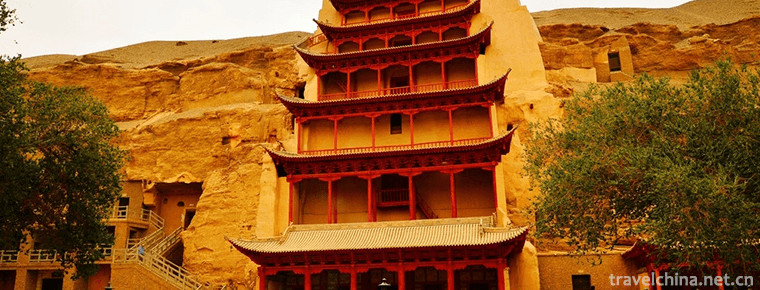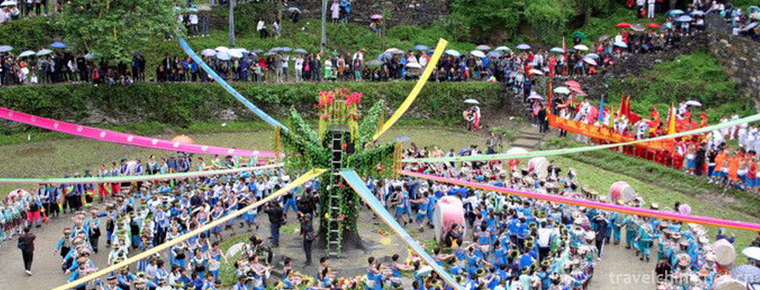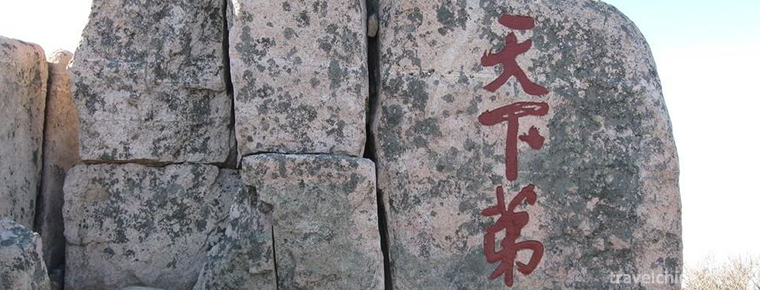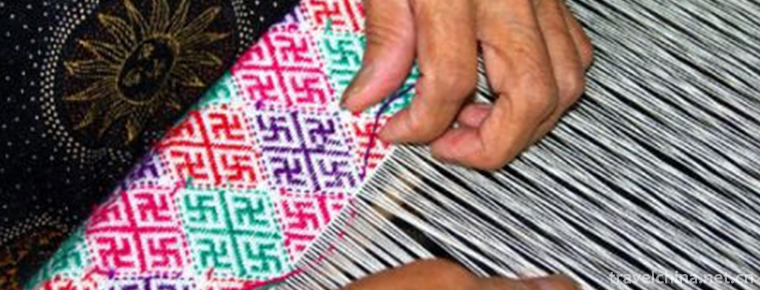Traditional Marriage Customs of the Han Nationality
Traditional Marriage Customs of the Han Nationality
The ancestors of the Han nationality believed that dusk was auspicious, so they would marry at dusk. Therefore, the etiquette of marriage was called "dusk rite", which later evolved into a wedding ceremony. Han people believe that red is a symbol of auspiciousness, so the traditional wedding customs always use bright red to set off a festive and warm atmosphere. Auspiciousness, blessings and filial piety have become the main theme of the wedding. Almost every ritual in the wedding is permeated with Chinese philosophy.
Legend has it that the earliest marriage relationship and wedding ceremony of the Han nationality began with Fuxi's marriage system and Nuwa's media appointment. "Tongjian Waiji" contains: "In ancient times, men and women were no different, Taihao began to marry, with the ribbon as a gift." Since then, Lipi has become one of the classic wedding gifts. Later, in addition to the ritual of "Li Pi", parents had to be told; in Xia Shang Dynasty, there appeared the etiquette of "Ying Ying Ting" and "Ying Ying Tang". The Zhou Dynasty was the era of rituals. At that time, a complete set of marriage etiquette was gradually formed. There were detailed regulations in Etiquette, and the whole set of rituals was combined into six rituals. Six Rites Wedding has been the template of traditional Chinese wedding ever since.
History
The initial form of wedding began at the end of primitive society, and gradually evolved from the traditional engagement in the Fuxi era to the wedding ceremony in Xia and Shang Dynasty, and then to the complete Six Rites in Zhou Dynasty, which had initially laid the foundation for the traditional wedding of the Han nationality. Through the development of the times, all kinds of wedding ceremonies become more complicated and warm.
In the Pre-Qin Dynasty, there were five kinds of ceremonies, including adoption, name inquiry, Naji, levy and invitation (plus the "six rituals" at the wedding ceremony), and later generations gradually evolved into etiquettes such as dressing-up, dressing-up and shop-making.
In the first three years of Emperor Hanping's reign, Liu Xin and other miscellaneous wedding ceremonies were arranged. The family members of Dr. Sifu Gongqing Chuan Qianlong Shi could be welcomed by them. The next year, the empress adopted them and Buji. During the Wei, Jin and Southern and Northern Dynasties, the Royal prince's wedding was not welcomed. From the Eastern Han Dynasty to the Eastern Jin Dynasty, he was not married according to the six rituals.
After the Tang Dynasty, the prince began to welcome, and the prince's wedding would follow the six rituals.
Later, "asking for fame" was in "adopting" and "asking for time" was in "accepting success". So although conceptually it still followed the six rituals, in fact, only the four rituals were "adopting", "Naji", "accepting levy" and "greeting intimately". Zhu Zi's family rites combined Naji with Nazheng, so there were only three rites.
During the Yuan Dynasty, more wedding proposals were added to the wedding ceremony.
In the first year of Hongwu in Ming Dynasty, Zhu Zi's family rites were used as the standard to make the wedding ceremony. In the Qing Dynasty, according to the records of Tongli, there were nine rituals for Han officials since they had more than seven items, but they all included the rituals of becoming a husband and wife. In ancient times, only five rituals were left, namely, marriage proposal, adoption, currency acceptance, invitation and welcome. The marriages of other scholars and ordinary people are relatively simple, and the folk weddings usually follow Zhu Zi's family law.
Etiquette and custom
1. Three Books: According to the traditional etiquette law of the Han nationality, it refers to the documents exchanged in the process of engagement, namely "engagement letter" - Book of engagement, which is exchanged at engagement; "gift book" - list of gifts, which lists the types and quantities of gifts, and exchanges at big gifts; "greeting letter" - Book of marriage, which is used when the bride passes the door on the wedding day.
2. Six Rites: refers to the procedure from courtship, matchmaking to marriage and marriage. They are "adopt" - commonly known as matchmaker, that is, the man's family invites matchmaker to propose marriage to the woman's family, after the woman's family promises to propose marriage, the man's family goes to propose marriage before gifts; "ask name" - commonly known as "eight characters", the matchmaker asks the woman's birth date and name, to prepare the ceremony of marriage; "Naji" - that is, after the man's family is augured by Bodji, the gift preparation notifies the woman's family, and the marriage is preliminarily agreed upon; "Naji" "Zheng" - also known as too big ceremony, the man chose the auspicious day to hold a big engagement ceremony at the woman's home; "invitation period" - choose the auspicious day to get married, in the old days, the auspicious day is usually two months, not like March, June and November, there is a Sanyun; choose the sixth because he does not want the new couple to only half-life marriage; November implies an inexhaustible meaning. "Welcome" - On the day of the wedding, the man takes YingShu personally to the woman's house to marry the bride.
3. Bed-setting: A few days before the wedding, choose a auspicious day, in the new bed will be mattress, bed sheets, and then spread on the dragon and Phoenix quilt, be sprinkled with all kinds of happy fruit, such as peanuts, dates, longan, lotus seeds, which means that the newlyweds have noble children early. The people who carry the bed, make the bed, and Sahiko are carefully chosen "good life people" - parents are alive, brothers and sisters are complete, marriage is harmonious, children are in pairs, naturally hope that such people can bring good luck to the new couple.
4. Dowry: The escort of a woman's family is a symbol of her family status and wealth. The dowry should be delivered to the husband's house at the latest one day before the wedding. Apart from clothes and accessories, dowry mainly symbolizes good omens, such as scissors, butterflies flying; spittoons, also known as descendant barrels; vases, meaning flowers blossom rich; shoes, meaning old age; rulers, meaning good fields, etc. Of course, customs and exquisites vary from place to place.
5. Top: Premarital rituals for both men and women. On auspicious occasions, men and women comb their hair in their respective homes from the comber, while combing, and say aloud: one comb to the end, two comb to the white hair eyebrows, three comb to the children and grandchildren, four comb to four silver bamboo shoots. "Overhead" is a very exquisite ritual. To comb your hair with a new comb, the person who helps "go up" must be "a man of all blessings". That is to say, he is a man with all six relatives and all his children.
6. Hold a red umbrella: On the day of greeting relatives, the bride's sister or Bridesmaid will help the bride's home and stand in the open air. The sister or Bridesmaid will hold a red umbrella on the top of the bride's head, which means "spreading leaves" and sprinkling rice to the sky and the top of the umbrella.
7. Change genealogy: Families of men and women exchange genealogy as evidence of affinity. When a matchmaker mentions a match, if men and women do not coincide with each other, they will change the Geng genealogy.
8. Guo Wending, too big gifts: The man will choose a lucky day, bring some gifts to the woman's home, gifts are generally three animals, wine gifts, etc., and officially offer a letter of engagement. After "Guowending" is held, the ceremony of "excessive ceremony" will be held, which is the most solemn and most important ceremony of engagement, because the ceremony will wait for the formal conclusion of the engagement. Like Guo Wending, a man's family will choose a lucky day to bring his employee's money and gifts to the woman's home, and the woman's family will prepare gifts back. Gifts are even and even in order to get the meaning of "good things in pairs".
9. Weeping for Marriage: According to the Book of Rites, Confucius said, "Marry a girl's home, three nights without stopping candles, missing each other." In ancient times, because transportation was not convenient in modern times, it was very difficult for a daughter to have a chance to see her family after she got married. In fact, a married woman can not return to her mother's home to visit her family at any time, as it is today. To return to her mother's home, she needs the approval of her husband's family. In addition, it is also said that crying marriage originated from the ancient times when women could not have a free marriage, so they would use the song of crying marriage to accuse the ancient unfair marriage system.
10. Cover: The bride usually wears a three-foot square red scarf over her head. This red scarf is called "Cover", commonly known as the "Cover". There are two kinds of opinions about the marriage custom of covering the head: one is that covering the head is to cover up the shame; the other is that it originates from the ancient plundering marriage, which means that the bride will never find the way back after covering the head.
11. Welcome: In ancient times, when a man married, he had to go to meet his wife. "Welcome" is the most solemn etiquette in the Six Rites. There is no bride without a bridegroom. Ancient friendly, there are hiking, there are useful cars, the more common is to use eight sedan chairs to greet relatives. People who lift sedan chairs must be strong. When they meet other people's sedan chairs, they must never meet them. They must walk around. When welcoming relatives back, we should find a way to go back, so as not to go back. If you pass temples, ancestral halls, graves, wells, rivers and other places on the way, you must cover the sedan chair by Zhang Hongfei, the man who marries you, as the meaning of "evading evil spirits". If you meet a funeral procession on the way, the person who greets relatives will say, "Today is auspicious, encounter treasure!" Because the homonym of the coffin is "Guan Qian", that is to say, to see the meaning of treasure, which is mainly for the sake of good fortune.
12. Church worship: also known as "worship heaven and earth", is a very important ceremony in the wedding. "Baitang" is not an ancient "three books and six rituals". This marriage custom became very popular after the Song Dynasty. After "Baitang", the woman became a member of the male family. When "worship hall", the master of ceremonies who presided over the wedding would say aloud: "One worship heaven and earth, two worship the lobby, husband and wife worship, all into the cave." In fact, worship of heaven and earth represents the worship of the gods of heaven and earth; worship of the high hall is a manifestation of filial piety; so the couple worship each other as guests.
13. Going out: Going out means that the bride leaves her home. When she arrived at Jishi, the lady had to carry her sedan chair on her back; it was said that if the bride landed on both feet, she would bring bad luck. When going out, the bride's sister-in-law can not be sent to each other. This is because the sister-in-law has the homophonic sound of broomstick sweeping. It is believed that it will bring bad luck when the sister-in-law is sent out. When the bride goes out, the bridesmaid holds up the red umbrella to protect the bride and takes the meaning of opening branches and spreading leaves. Sister Daou and her sisters sprinkled rice over the sky, umbrella roof and flower cart roof as they walked along. They were used to "feed the golden chicken", meaning that the chicken would not peck the bride after pecking the rice. Finally, before boarding the float, the bride bows to her relatives and friends to show her gratitude.
14. Crossing the door: Crossing the door means that the bride formally enters the man's home after leaving the house from the woman's home, and meets Weng Gu and other elders of the man's family. Legend has it that Weng Gu can't see new people coming into the hall directly, because they will rush into each other. So when the woman walks into the man's house, Aunt Weng will come out of the room to meet the new people in the hall. Then the bride and groom will worship heaven and earth before their ancestors. New people will kneel down to Weng Gu's tea. Aunt Weng can say some good wishes and give jewelry and gifts to the bride. The bride should wear the ornaments as soon as she receives them to show her gratitude. Next, the couple serves tea to other elders and relatives.
15. The return of the three dynasties: Guining. The three dynasties refer to the third day after marriage. Accompanied by the husband, the new embrace returns to her mother's home with burning pigs and gifts for ancestors, and then returns with her husband to her husband's home. It is said that such a custom existed in the Pre-Qin Dynasty. Guining means that Huinianggao repays his parents with peace. In ancient times, there was no modern convenience for transportation. If a woman wanted her husband's home far from her mother's home, the so-called married husband would not have the opportunity to return to her home after she arrived at her husband's home. So returning home may be the last chance for a woman to step on her mother's house. Because of this, people attach great importance to Guining as a wedding custom. When returning home, men need to prepare: one burning pig, two boxes of Western cakes, one pair of wine, two pairs of bamboo and shrimp, one pair of chickens, lettuce, two baskets of raw fruit, two boxes of [, two boxes of Yimian, two kilograms of chicken lanterns, gold belly and pork.
16. Make-up: It's the etiquette for men to send gifts and urge women to make up for the bride as early as possible. In the Song Dynasty, the first three days of greeting, the male family sent to the female family things such as make-up buns, gold covers, flower fans, etc., while the female family responded with gold and silver to win the imperial court, Luohua Putou, green robes, boots and so on.
17. Giving dowry: A few days before the reception, the women send their dowry to the men's ceremony. The dowry is often packed in boxes and cages. Others spread out the dowry with square tables one by one to show off their dowry and send it to the man's house in a huge column. Dowry usually has cabinets, bedding, jewelry, clothes, satin, four treasures of the study and gold and silver utensils, as well as field houses, shops, pawnshops as a dowry. In Zhejiang, there is a kind of dowry called "descendant barrel" (the barrel has a big cover for the bride's childbearing), which contains red eggs, happy fruits, so-called "send children", with the intention of blessing. In Shaoxing, there are also "daughter's wine" as a dowry, that is, after her daughter's full moon or years of age, several altars of wine are buried underground, and when her daughter is married, they are taken out as a dowry gift and sent to the man's home.
18. Lounge: In modern times, this is a ceremony for newly-married couples to receive congratulations from relatives and friends on their wedding night and to play in their bridal chambers. There are folk saying that "three days of marriage are no big or small", "Joy and joy, the more jolly, the happier". There are different ways and methods of "boarding houses" in different places. The level of bothering can also be classified as elegant and vulgar. Sometimes it goes too far, which often brings embarrassment and unhappiness to both the host and the guest. However, because it adds a warm atmosphere to the wedding, this program is often indispensable in subsequent weddings.
Technological process
Three stages
1. Premarital gifts, namely "engagement" and "adoption";
2. The formal wedding ceremony, that is, the etiquette of "marriage" or "marriage", is also called "dusk ceremony" in ancient times, which means the ritual of sunset and the combination of husband and wife.
3. Marriage ceremony is the gift of "becoming a wife", "becoming a wife" or "becoming a son-in-law", which indicates the role of men and women after marriage.
In the traditional marriage customs of the Han nationality, premarital rites and formal weddings are the main procedures, which all originate from the six rites of the Duke of Zhou.
Basic process
Including sacrifice to ancestors before going out in the south, departure of the greeting fleet, cannon-fire, waiting for the groom with a boy's tea tray, bride's intimate pleasure, bride's farewell, bride's going out, bride throwing fans on the salute car, cannon-fire, bride touching oranges, male elders leading the bride, wedding banquet, guests, cave room, etc.
Articles
The traditional wedding ceremony of the Han nationality is a joyful ceremony, so it is called celebration. All wedding ceremonies are decorated with auspicious wedding items. Such as posting the scarlet letter, covering the bride's head with a red cap, wearing a red coat, the groom's chest wearing a big red silk, and so on. These red auspicious items not only bring a festive atmosphere to the wedding, but also imply that the married couple's life will be more prosperous after marriage.
The necessary items for the wedding are:
Flower sedan chair: four people lift, eight people lift two kinds, and there are dragon sedan chair, Phoenix sedan chair. The sedan-chair body is covered with red mantle and green mantle, with dragons and phoenixes on it and silk spikes hanging at its four corners.
Cheonggong umbrella fan: in the welcoming team, before the sedan chair. Make the whole wedding ceremony lively and spectacular.
Firecrackers: On the way to the wedding car, firecrackers should be set off all the way to celebrate.
Fengguan Xiaban: Married women's families, rich and poor, are very particular about their wedding dresses. They wear red jackets, embroidered feet, fringed waistbands and an embroidered colored skirt. They wear a "phoenix crown" with velvet balls, pearls, jade silk pendants and other decorations, and then wear a brocade "Xiaban" embroidered with various auspicious patterns on their shoulders.
Head Cover: In ancient times, brides wearing Phoenix crown and silk cover their heads with red cloth to cover up evil spirits. Red takes auspicious meaning. The cover will be uncovered by the groom when it enters the cave.
Saddle: "saddle" and "safety" in one voice, take its meaning of "peace" for a long time. Put it on the threshold of the cave and let the bride cross, which means that the bride crosses the saddle and keeps peace for the rest of her life.
Fire basin: A fire placed at the gate, let the bride cross over, implying that the day after marriage is prosperous.
Candles: Paired red red candles are used in weddings to light in halls and caves. Because there are many gold, silver, dragon and Phoenix decorations on it, it is called "flower candle".
Weighing rod: After entering the cave, the groom uses the weighing rod to pick out the bride's red cap, and to "satisfy" the bride.
Taboo
Taboo for getting married
One: Taboo of Marriage Time
Marriage should be avoided in June, March and July. The traditional custom holds that the bride who marries in June of the lunar calendar is also called "half-moon wife", because June is half of the year, and the bride in June is equal to half of the bride, which is equivalent to whether there is a bride or not, and the couple divorces easily after marriage. If there is a sudden death of a direct family member in the family, then it is not appropriate to do a wedding or go to marriage registration in that year, otherwise it is a "life in death" offender. In addition, March and July of the lunar calendar are the days of ghosts. For elders, the above special months are not very good marriage, so try to avoid.
Three days after marriage, the groom accompanies the bride back to her home, commonly known as "return home". On the day of return, the bride must rush back to her husband's home before sunset. If it is too late, the bride stays at the woman's home, remember not to share the room, and must sleep separately, so as not to cause bad luck to the bride's family. Beyond that, it's better not to spend the night outside. It is also forbidden to take part in any wedding or funeral celebrations within four months of marriage.
Second: taboos on marriage ceremony
After setting up a new bed, the bridegroom-to-be had better find a young boy to sleep in the new bed together on the eve of the wedding. Otherwise, he violated the taboo of sleeping in the empty bed. The so-called "sleeping in the empty bed, never dying, or dying" is considered a bad omen. When the bridegroom goes to the bride's house to marry the bride, the bride should weep with joy when she leaves the house, and the sooner she cries, the louder the better. This is called "Shuitou" Wangnu's house, and the more she weeps, the more she intends to weep.
3. Attention should be paid to the location of marriage
When you install a new bed, put the bed in the right place. Don't oppose the sharp corners of the table wardrobe or any objects. New beds also need to put some auspicious things on the bed, such as lilies, jujubes, lotus seeds, meaning a hundred years of good marriage, early birth of your son and so on.
Fourth: Taboos in Wedding
All dresses, gowns and shoes worn by the bride on the wedding day should be brand-new, and the dress should avoid pockets, because pockets can take away the fortune of the bride's family, so it is better to choose pocketless ones. The bride holds flowers in her hand and avoids selecting new ones, which are apt to wither and be taboo about marriage. If you want to choose, you'd better choose Lianhua and Pomegranate. Lianhua means that a girl is married, and pomegranate means that she has many children and many grandchildren. Newly-married couplets should be hung up at the latest on the eve of marriage, removed after one month of marriage, and when choosing and purchasing couplets, the couplets of men and women should be separated.
Wedding taboo
1. To find a teenage boy and groom to sleep together in bed on the night before marriage, because it is traditionally believed that the husband and wife who sleep in an empty bed are dead.
2. On the wedding day, before going to bed at night, all people try to stay away from the new bed, especially the new must not touch the bedside, it will be unlucky.
3. Don't let people sit in a new bed on the wedding day.
4. On the wedding day, the bride should not lie in bed at will, otherwise she will be ill in bed.
5. Marriage avoids people's observance of the zodiac tiger.
6. When the bride goes out on the day of marriage, her aunt and sister-in-law cannot be sent to each other.
7. When the bride leaves her mother's home on the day of her marriage, the more she cries, the better, because she can't cry without crying.
8. The bride's clothes should not have pockets, so as not to take away her family's fortune.
9. On the third day after marriage, the newlyweds bring gifts back to their mother's home, that is Guining. But remember to rush back to your husband's house before dark and not stay overnight at your mother's house.
10. Within four months after marriage, the bride shall not participate in any ceremony of wedding and funeral celebrations, so as not to be overjoyed.
11. The bride's mirror should not be lent to others.
12. The bride is not allowed to spend the night outside unless necessary (such as honeymoon travel) within four months of her marriage.

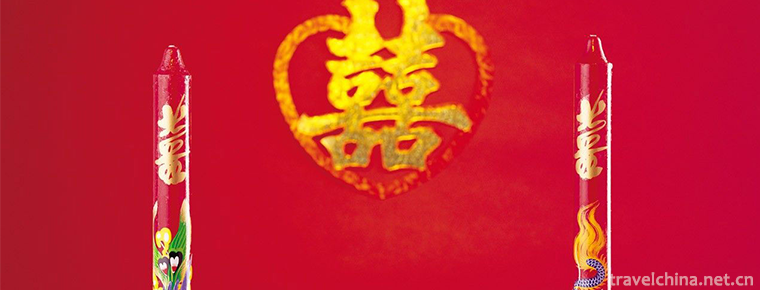
-
Yungang Grottoes
Yungang Grottoes is located in the southern foot of Wuzhou Mountain, 17 kilometers west of Datong City, Shanxi Province, northern China..
Views: 243 Time 2018-11-24 -
Mingcui Lake National Wetland Park
Yinchuan Mingcuihu National Wetland Park is located in Zhangzheng Town, Xingqing District, Yinchuan City, Ningxia. It is 9 kilometers away from Yinchuan City and 3 kilometers .
Views: 170 Time 2019-02-07 -
Mogao Grottoes
Mogao Grottoes, commonly known as Thousand Buddha Caves, are located in Dunhuang at the western end of Hexi Corridor. It was built in the pre-Qin period of the Sixteen Kingdoms..
Views: 245 Time 2019-02-07 -
Castle Peak Pass Scenic Spot
Qingshankuan is located in the north of Qianxi County, 40 kilometers away from the county town, located in the Yanshan branch, the hinterland of Daqingshan Mountain..
Views: 192 Time 2019-02-07 -
Lu Opera
Luju opera, formerly known as "pour seven operas", is commonly known as "small opera", "prayer and sacrifice opera", "small pour opera", "small barbaric op.
Views: 135 Time 2019-05-15 -
Miao Flower Jumping Festival
Flower Dancing Festival is a traditional festival of the Miao people in Anshun. Legend has it that Yang Lu, a hero of the Miao people, rose up. Till now, Huashan, outside the North Gate of Anshun, is .
Views: 206 Time 2019-06-05 -
Legend of Mount Tai
Taishan legend is one of the folk legends in Shandong Province. According to legend, the history of the Theocracy of Taishan God in charge of life and death can be traced back to the pre-Qin period. A.
Views: 194 Time 2019-06-18 -
Linear cavity
Line-tune opera, also known as Line-score opera, is an ancient traditional opera in Shanxi Province. It first appeared in the Han and Tang Dynasties, and developed greatly. It flourished in the Song D.
Views: 152 Time 2019-07-03 -
Brocade Weaving Skills of the Zhuang Nationality
After thousands of years of development, the brocade has its own system of three categories, more than 20 varieties and more than 50 patterns. It is famous for its durability, exquisite skills, unique.
Views: 199 Time 2019-08-16 -
Longhua Baxian Mountain Giant Buddha
Longhua Baxian Mountain Giant Buddha is located in Baxian, Longhua Town, Pingshan County, Yibin City, Sichuan Province. Since the Bamiyan Buddha in Afghanistan was bombed by the Taliban.
Views: 301 Time 2020-10-16 -
Nanchong cultural undertakings
By the end of 2019, Nanchong has 10 cultural centers, 242 cultural stations and 10 public libraries. There are 8 museums, 28 cultural relics protection and management institutions, 18 national key cultural relics protection units, 112 provincial-level cultural relics protection units.
Views: 296 Time 2020-12-17 -
Guangan primary industry
In 2019, the sown area of grain in Guang'an City is 287000 hectares, and the total grain output is 1.8 million tons, an increase of 1000 tons or 0.04%. Among them, the rice output was 1.047 million tons, down 0.4%; the corn output was 448000 tons, an incre.
Views: 160 Time 2020-12-19


